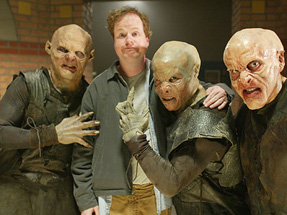Mythology: Show Runners
By Martin Felipe
December 31, 2009
As the decade closes, and everyone starts compiling their lists, I decided to take a different approach. First, I'm not going to rank or adhere to the common ten-slot format. Second, rather than coming at it from the point of view of the shows themselves, I'm going to go with the creators, the voices behind the shows, more commonly called the show runners.
After all, as I've argued, we're in an increasingly sophisticated television age, and the auteurist aesthetic of film is making its way to the small screen. Show runners now develop followings, the way a Spielberg or a Cameron might enjoy in theatres. For the purposes of this column, I'm sticking to the names more associated with mythology television, also known as genre TV, a term that tends to ghettoize - which is unfair because while the Aaron Sorkins of the television landscape are certainly as talented and as influential as their sci-fi counterparts, they're the ones getting the awards, and much of the mainstream recognition. Not that mythology show runners don't get acclaim. They do, but they remain on the outside looking in, while they continue to influence and reinvent the medium.
Okay, well, maybe that's not entirely true. Lost did win the Emmy for best drama in its first season. Since then, however, Damon Lindelof and Carleton Cuse's island drama has had its ups and downs in terms of mainstream acceptance, and downs, downs, and even further downs in the ratings. It's won a few acting awards, and eventually got more nominations for the show itself, but as it grows more complex, and, let's be blunt about this, more sci-fi/fantasy, it becomes more obvious with every episode that Lindelof and Cuse are pretty unique in television's history.
Their predecessors are there, of course. David Lynch's Twin Peaks, Chris Carter's X-Files, but I can't really think of another show runner that gave us anything like Lost. While Carter teases us with a series-long mystery over the years, The X-Files relies more often than not on Mulder and Scully's week-to-week investigations. Peaks is more of an experiment, than anything else, successful in many ways, but unable to sustain the central "Who killed Laura Palmer?" macguffin for more than a season and a half.
Lindelof and Cuse have created a show predicated on delayed gratification in a supposed era of shorter attention spans. Is there another show that asks its viewers to wait six years for answers? For that matter, as smaller answers come, and bigger questions grow, is there a show that gets stranger and stranger? I mean, we know from the pilot that we're not dealing with verisimilitude on this island, but who'd have predicted that the monster was a cloud of black smoke? Or that there's a wheel in the bowels of the island that, when turned, causes time travel? Or that all island visitors are merely players in a contest between two as yet undefined supernatural entities?
Continued:
1
2
3
|
|
|
|




